- Home
- Taylor Caldwell
Testimony of Two Men Page 10
Testimony of Two Men Read online
Page 10
"I can go home soon, can't I, Uncle Jon?"
"I hope so," he said. "Aren't you going to speak to Dr. Morgan?"
The child eyed him shyly but did not speak. When he said, "Hello, Martha," she bent her head and the golden hair fell like a curtain over her cheeks.
"Now, Martha, Dr. Morgan is going to help me with you," said Jonathan. "He looks like a big red bear, doesn't he, but he doesn't bite little girls. Honestly."
The child giggled convulsively and peeped up at Robert. Jonathan gave him the chart. "Acute anemia. Intractable fever of 102°. History of severe infection of throat, now reduced. Present slight infection of lungs and nose. Joint pains. Transient bleeding from mouth, bowels, kidneys and nose. Slight liver enlargement. Spleen perceptibly enlarged. Lymph nodes discernible. Pallor. Lassitude. Diagnosis of admitting physician, Dr. Louis Hedler: Rheumatic fever with few signs of heart involvement. Family physician's diagnosis:" There was, as yet, no diagnosis recorded from Dr. Jonathan Ferrier.
Robert laid down the chart. He looked searchingly at the little girl, at her ghostly color, at the lack of pinkness in her lips, at the bluish hollows under her eyes. He thought of something. It sickened him. He had never seen a case—
Jonathan was watching him sharply. "Martha has been slightly sick, so her parents told me yesterday, when I sent her here for four weeks. A little cold, they said. Then two days ago she became really sick, and they called me. She came in last night. Well?"
Robert went slowly to the little girl, who was now staring at him inquisitively. He took her hand; it was chill and faintly tremulous. She let him examine her throat. He took out his stethoscope and listened to her heart. It was a little more rapid than in health, but there were no overt heart sounds. Her tongue was very pale, but her gums were congested. A holy medal, of gold, and on a thin gold chain, hung about her neck, and on the bed table beside her was a rosary. Robert gently dropped her hand; he stared at the silver crucifix on the rosary. He was silent.
"Well?" said Jonathan. His voice was curiously muffled.
"You've taken blood? There doesn't seem to be any reference to a blood test on the chart. I—I'd like to see if there are any blast forms—and the leukocyte count."
Jonathan sighed. "Am I very sick?" said the little girl with anxiety. "Uncle Louis said I had rheumatism. Am I going to be a cripple?"
"Uncle Louis," Jonathan began, "is an old—" He stopped. "Of course, you aren't going to be a cripple, Martha. In fact, when this fever goes down a little, you can get out of bed. And a little later, you can go home." He added, "You can go home."
A cheerful nurse came in, all rosy dimples and bounce, with a white cap on her high black pompadour. "Good morning, Doctors!" she sang. "We are doing very well this morning! We had a lovely little breakfast, too, and enjoyed it! Didn't we, Martha?"
"Yes, ma'am," the child said with politeness.
"And such a pretty nightgown!" said the happy nurse, admiring the white silk, embroidered garment Martha wore. "Such a nice sleep in it."
"Bob," said Jonathan, "this is one of Martha's private nurses, Mrs. Chapman. Mrs. Chapman, Dr. Morgan, my replacement."
"How nice," said the pleasant woman vaguely.
"Bring me a glass slide from the laboratory," said Jonathan. "And quickly, please."
He sat down on the side of the bed and regarded the child with real tenderness. "Martha, I'm going to prick your ear and take a little blood from you. It won't hurt much; just a little. You aren't going to make a fuss, are you?"
The child immediately looked frightened. Jonathan took one of her hands and held it warmly. "I don't like to bleed, Uncle Jon," she said. "It makes me sick to look at it."
"I won't let you see it, then. You just keep your eyes closed, and when I tell you to open them, you won't see any blood at all. How's Tommie?" he asked, referring to her infant brother.
"He has a cold, too," said Martha. "Not very bad, though, like mine. His knees aren't swollen either." She smiled affectionately. "He's better than all my dolls."
"Of course he is. Your mother will be in soon, Martha, when Tommie is settled. By that time well know exactly what's wrong with you—and when you can go home."
"And I don't have rheumatism?"
Jonathan looked at Robert, and the child looked at him. "No," said Robert. "You don't have rheumatism, Martha." He tried to hold Jonathan's eyes, but they shifted away from him. There was a sudden hard silence in the room.
"What do I have, then?" asked Martha with the curiosity of childhood, and the importance.
"We have to look—at things—first," said Robert, and felt sick.
"You mean, it isn't bad at all?" she said in her chirping voice. She was a little disappointed.
"Be cheerful and optimistic at all times before the patient," Robert had been sternly taught "Never indicate by tone or manner that the patient is gravely ill or in a terminal condition." He thought it nonsense but had not so expressed himself to his teachers.
How did one say to a child, "Darling, you are going to die"?
Please, God, he said in himself, let me be mistaken. After all, I've never seen a single case before. I could be wrong. Let me be wrong. He gazed at the child and saw her beauty and the sweetness of her eyes. He turned away and walked slowly to the window and looked outside and saw nothing. It was wrong for the young and lovely to die! They had a celebration to make to life. Life was not a joyous thing in itself—he knew that, for he was a doctor and had seen too much pain and death and had heard too many desolate cries. But it was like spring, in its infrequent periods, and a child had a right to spring. He heard the door open and shut and the bright voice of Mrs. Chapman, bringing the slide.
"Now, Martha," Jonathan was saying. "Just close your eyes. You'll feel a little prick. Tell me, how is school?"
"I don't like it, Uncle— Oh!" she cried.
"There. Just two seconds. Keep those eyes closed. Good girl! Mrs. Chapman, take it to the laboratory and set it up. We'll join you in a few minutes. Martha? It's all over. You can open your eyes now. It didn't really hurt, did it?"
She gave a small dry sob, then smiled. Robert turned at the window; the sun made a halo of the child's silken hair. "No, it really didn't hurt. Much. Uncle Jon, Father McNulty called the hospital and he's coming to see me today. Isn't that nice?"
"Wonderful," said Jonathan. "Fine." Robert saw his face and turned away again. "And now," said Jonathan, "we'll leave you for a few moments to count all the nice red things in that blood I took from you."
He rose and the two doctors left the room. Jonathan closed the door slowly and heavily. He said, "Well, Doctor, what is your on-the-spot diagnosis?"
Robert could not remember when he had last felt so wretched and sad. "I hope I'm wrong," he said. "After all, I know—it—only from textbooks. I never saw a case."
"Of what?"
Robert hesitated. "Acute leukemia. Extremely rare." Jonathan was silent. His head was bent. "Tell me I'm wrong," Robert pleaded. "That's a beautiful little girl—"
"Let's look at the slide," said Jonathan, and they went to the laboratories, not speaking as they walked through the long corridors. In that same silence they soon returned to Martha's room. They heard her giggling as they opened the door. Dr. Louis Hedler was sitting near the bed in a comfortable chintz wing chair, and he had apparently told the child some agreeable joke. He turned his head when he saw the younger doctors, and nodded pleasantly and held out his soft fat hand. He more than ever resembled an amiable toad, and his head and face were completely bare of hair and his nose was snub and broad.
"Morning, Jon," he said. "Morning, Dr. Morgan. Hear you are joining us on the staff. Fine. Hope you'll be happy with us." He shook Robert's hand vigorously. "Now, what's this I hear? You took blood from Martha, with a big knife, she says. Why?" He was still smiling happily, but the huge brown eyes were hard and penetrating,
"Just for fun," said Jonathan. "We like to hurt little girls, Louis."
"I did write down
that I thought Martha had anemia as well as, ahem, rheumatism. What did your precious slides show?"
"Anemia."
"Obvious, obvious! At her age. Very common. Nothing to be alarmed about. It's those joint pains that worry me. And a suspicion about her heart—"
"Never discuss a patient's condition in his presence," Robert had been taught. But Dr. Hedler, Jonathan had said, was a "diploma-mill" doctor. Robert had never been taught that a patient was hardly sentient and was always totally ignorant.
"Uncle Jon said I wasn't very sick," said the child, with new anxiety at the mention of her heart.
"Of course you're not sick!" cried Dr. Hedler, with immense joviality. "I—or rather, Jon here will prescribe an iron tonic for you and you'll soon be as right as rain! I promise you." He stood up and patted the child's cheek, but she was looking at Jonathan for confirmation.
"Don't worry, Martha," he said. "There isn't anything wrong with your heart." Dr. Hedler frowned. "Louis," said Jonathan, "I've a case down the hall I'd like to discuss with you."
"One of yours? Don't tell me, Jon, that you give a fig for my opinion!"
"There's always a first time," said the younger doctor. "Coming, Bob? Martha, I'll come in again before I leave."
Jon carefully shut the door behind him, and the three doctors stood alone in the carpeted corridor. "Well?" said Dr. Hedler, with impatience. "Where is your patient?"
"You've just seen her, Louis. And we just came from the laboratories, remember."
"Yes, yes, so you said! You and your highfalutin slides and tests! Anemia, that's what you said, isn't it?"
"To Martha, yes. To you, no." He turned to Robert. "Dr. Morgan guessed it at first examination; it was only confirmed by the blood test. Bob, tell Louis what we found."
"Acute leukemia," said Robert.
Dr. Hedler's mouth fell open with an audible sound. His eyes popped. He swung to Jonathan. "Why, you're crazy! Jonathan, you don't believe what a young fella just out of the ranks of interns says, do you?"
"I do. I believed it last night, before the blood test."
"Crazy, crazy! Never heard anything so preposterous in my life! It's insane. Why, that disease is so rare that hardly any of us see a case for ourselves in a whole lifetime! As rare as an angel in hell!"
"It depends on the kind of angel," said Jonathan. "Louis, stop gulping. The child has acute leukemia. I'd tell you exactly what we saw in the smear, but they'd be only words to you. You must take our word for it."
"You arrogant young pup, with your scientific ideas!" Dr. Hedler was scarlet with rage. "Do you know what you're doing? You're condemning that beautiful little girl to death!"
"Not I," said Jonathan. "God did."
"Blasphemous, too." Dr. Hedler was sweating, though the corridor was cool. He regarded Jonathan with hatred. "No, I won't take your word for it! The child has rheumatic fever—"
"You're not her physician, Louis. I am."
Dr. Hedler breathed heavily. He was incredulous. "Are you going to tell her parents this—this enormity, this guess of yours?"
"It isn't a guess, Louis. I've seen eight cases over the past ten years. It's becoming more common. Twenty years ago only one doctor in a thousand ever saw a case; thirty years ago only one doctor in five thousand saw one. But the Greeks had a name for it: the White Sickness. Remember Hippocrates? He diagnosed it."
"I forbid you to tell her parents, Beth and Howard, this terrible thing! If it were possibly true, it would be bad enough. But a mere guess—"
"Not a guess. Louis, she isn't your patient. You can't forbid me to tell the truth to my patient's parents, even if you are Chief-of-Staff. And I'm going to tell them today. They must be prepared. The child has only a little while to live, at the best. And there's no treatment, Louis."
"Cancer of the blood! That's what you mean, isn't it? Cancer, at her age!"
"One child in twenty thousand now has cancer in some form, Louis. Don't you read the medical journals?"
Dr. Hedler seemed about to strike him. "The child has rheumatism, rheumatic fever! I've seen hundreds of cases. I was never wrong once. And I'll tell Howard and Beth that you are a fool, and not to believe you. Leukemia! Bah!" He slapped his hand against the wall and waddled off, trembling with fury.
"Hambledon's crowning medical glory," said Jonathan. "Smiling old Louis."
"Couldn't we have a medical consultation?" Robert asked with misery. "Someone from Johns Hopkins?"
Jonathan regarded him narrowly. "Don't you trust your own diagnosis? And mine?"
"I never saw a case," said Robert, "before this."
"I told you, I've seen eight. Not in this hospital, though, and not in the other hospital in town. In Pittsburgh. In New York. In Boston. In Philadelphia. Martha's case is classic. Well?"
Robert studied his large pink hands. "There's no cure; there's no treatment. There are remissions—"
"Not for long. And not always. Do you want to lie to her parents, Bob?"
"No. No, of course not You don't mean it, do you, that I must tell her parents?"
"No. I didn't." Jonathan smiled with bleak pity at him. "But I'd like you to be present. Break you in.
"And now for my other cases. I'm leaving them to you, Bob, with my compliments."
CHAPTER SEVEN
"'The quality of mercy is not strained,'except that God never heard that particular saying," said Jonathan, pushing open another door which led into a handsome suite of rooms consisting of a private bathroom, sitting room and bedroom, all cheerfully and expensively furnished and open to sun and wind and perfumed by many flowers. Jonathan put his hand on Robert's arm and said to him in a low voice, "This is a very interesting case. Old Jonas Witherby, eighty years old, old settler, old money, old mansion, good old bonds and stocks and fine old land. I want your opinion."
They went together through the sitting room to the bedroom where, in a Morris rocker, sat an old man with the most beautiful and tranquil face Robert had ever seen among elderly people. He was small and daintily made, with tiny hands and feet and a noble head richly flowing with white and rippling hair. He had the eyes of a young child, clear and blue and steadfast, a snub nose, a sweetly smiling mouth and pink ears. He sat by the window looking at the sunshine and smiling musingly, and when he turned his long head, Robert felt warmth and peace rising in him and something very close to affection.
"Ah, dear Jonathan," said Mr. Witherby, holding out one hand to the older doctor and winking. "I never see you without pleasure. How are you this glorious day?"
"Just terrible, Jonas," said Jonathan. "Everything's just as bad as it can be. By the way, this is my replacement, Dr. Robert Morgan."
The old man clung to Jonathan's hand and smiled merrily at Robert, then became sad. "How do you do, Doctor? You all seem to get younger all the time. Replacement for Jonathan, eh? You must truly persuade him to change his mind. What will Hambledon do without him?"
"Just jog along as meanly as ever," said Jonathan. He sat down in another chair, crossed his long legs and put his hands in his pockets and studied Mr. Witherby with an ambiguous expression. "Never mind. We won't repeat the old arguments for Bob's benefit. As he will replace me, I am turning you over to him. With your permission, of course."
"Certainly, certainly, dear boy!" Mr. Witherby smiled more radiantly than before and considered Robert with great interest. "Anyone you recommend—"
Jonathan stood up in his dark blue suit and gave the appearance, all at once, of extreme emaciation. He took Mr. Witherby's chart, frowned at it, laid it down. "Still weak, I see. Still eating like that proverbial bird; I know birds; they eat all the time, all through the damned day. But your nurses note down, 'ate breakfast like a bird.' Silly old hags. How did you sleep?"
Mr. Witherby sighed. "Please sit down, Dr. Morgan. You will find that chair very comfortable; I like to look at young faces. Well, Jonathan, you know at my age one doesn't sleep very well at all. I think, lying awake all night."
"And you have ple
nty to think about." Jonathan, still standing near the bowered dresser, looked at Robert. "Old Jonas here was a widower. Two sons, one fifty-three, one fifty-one. Both married, both deserted by their wives. Bill is in a private madhouse, Donald is a chronic alcoholic. DTs, most of the time. In a private sanitarium which dries him out, then looses him again. No daughters. No grandchildren. Wife," said Jonathan in the bald tone of a clinician, "committed suicide. Very sad, wouldn't you say?"
Robert was disturbed at this impersonal recital, which seemed cruel. He bent his head with apology to Mr. Witherby as if in some way he were guilty of Jonathan. But Mr. Witherby's fine old face took on a sad melancholy and dejection and he folded his hands with resignation on his knees. "It was always said that I had everything, from birth, but in reality, in my old age, I have nothing."
Jonathan snapped a pink rosebud from a vase and fixed it in his buttonhole. He was detached, as if no one were in this room but himself. He said, "Languid, listless, tired, enfeebled, anorexia, vague but disabling pains, sometimes severe headaches, though no hypertension, tachycardia frequently, some indications of mucous colitis, occasional rales in the lungs. Otherwise, no overt signs of disease. Well, Bob? Want to examine the specimen?"
Robert silently opened his bag and removed his stethoscope and various other instruments. No doubt, he thought, the sorrowful old man was suffering some psychosomatic ailments due to his unfortunate relatives and his disappointment in them. His examination was thorough. Mr. Witherby flaccidly submitted to everything as if nothing meant anything any longer to him. Finally Robert put away his instruments and looked long and earnestly at the old gentleman, his kind young eyes full of pity.
"No overt signs of disease," he repeated.

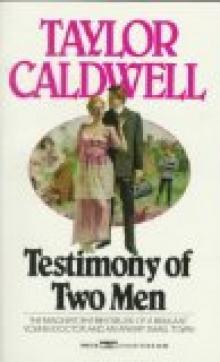 Testimony of Two Men
Testimony of Two Men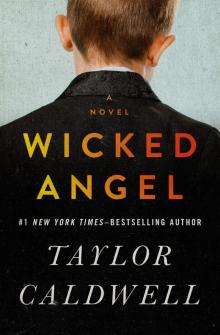 Wicked Angel
Wicked Angel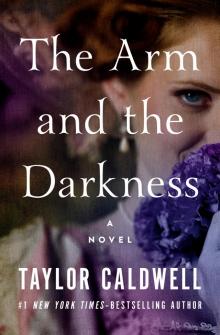 The Arm and the Darkness
The Arm and the Darkness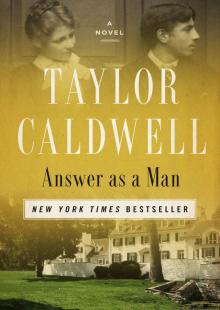 Answer as a Man
Answer as a Man Grandmother and the Priests
Grandmother and the Priests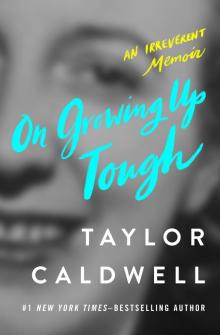 On Growing Up Tough: An Irreverent Memoir
On Growing Up Tough: An Irreverent Memoir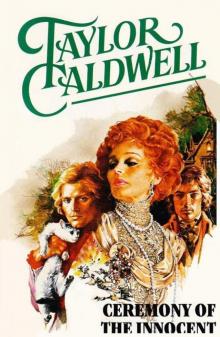 Ceremony of the Innocent
Ceremony of the Innocent The Listener
The Listener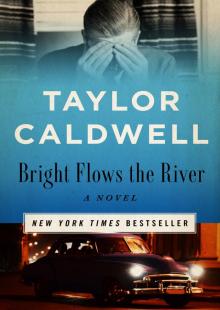 Bright Flows the River
Bright Flows the River The Earth Is the Lord's
The Earth Is the Lord's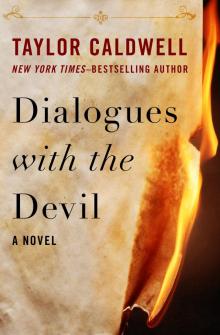 Dialogues With the Devil
Dialogues With the Devil A Tender Victory
A Tender Victory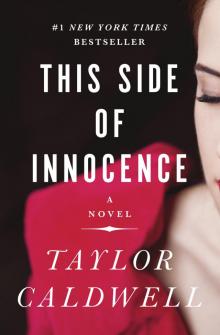 This Side of Innocence
This Side of Innocence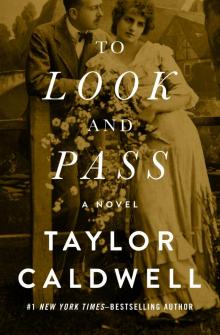 To Look and Pass
To Look and Pass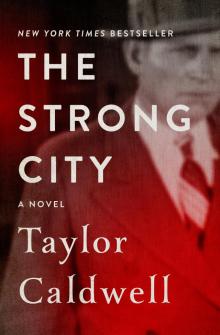 The Strong City
The Strong City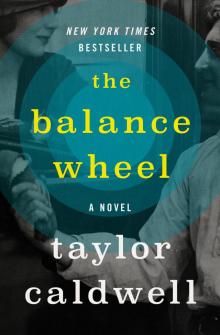 Balance Wheel
Balance Wheel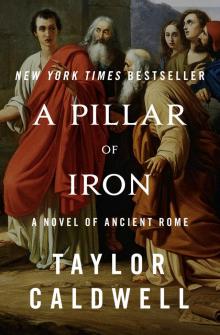 A Pillar of Iron: A Novel of Ancient Rome
A Pillar of Iron: A Novel of Ancient Rome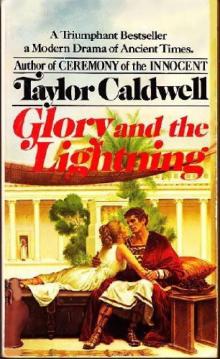 Glory and the Lightning
Glory and the Lightning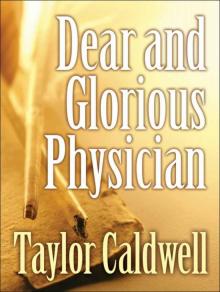 Dear and Glorious Physician
Dear and Glorious Physician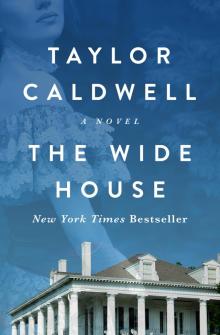 The Wide House
The Wide House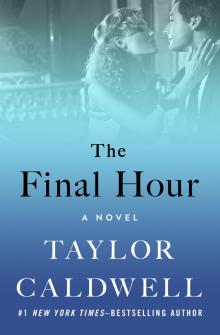 The Final Hour
The Final Hour Never Victorious, Never Defeated
Never Victorious, Never Defeated Unto All Men
Unto All Men The Turnbulls
The Turnbulls Your Sins and Mine: The Terrifying Fable of a World Without Faith
Your Sins and Mine: The Terrifying Fable of a World Without Faith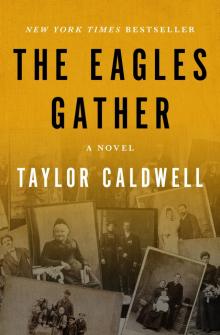 The Eagles Gather
The Eagles Gather Let Love Come Last
Let Love Come Last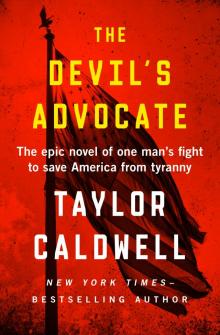 The Devil's Advocate: The Epic Novel of One Man's Fight to Save America From Tyranny
The Devil's Advocate: The Epic Novel of One Man's Fight to Save America From Tyranny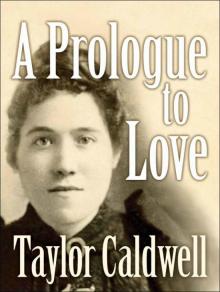 A Prologue to Love
A Prologue to Love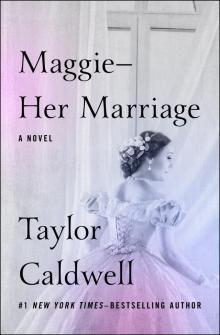 Maggie: Her Marriage
Maggie: Her Marriage The Late Clara Beame
The Late Clara Beame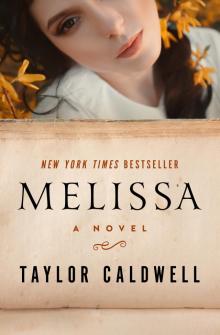 Melissa
Melissa Great Lion of God
Great Lion of God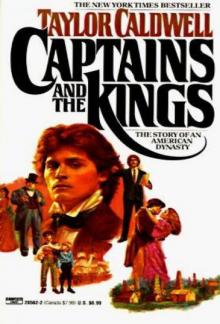 Captains and the Kings
Captains and the Kings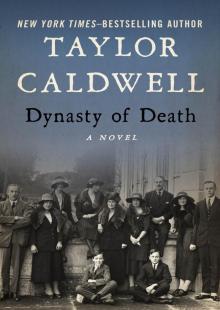 Dynasty of Death
Dynasty of Death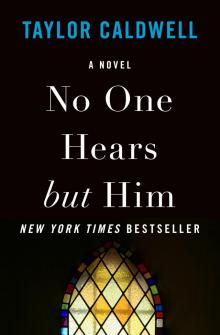 No One Hears but Him
No One Hears but Him The Sound of Thunder
The Sound of Thunder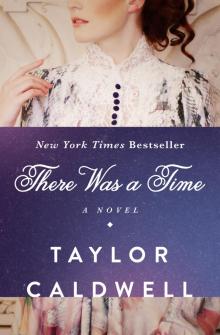 There Was a Time
There Was a Time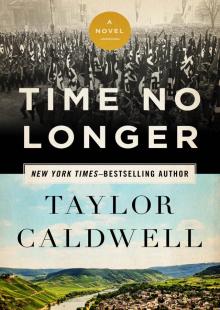 Time No Longer
Time No Longer I, Judas
I, Judas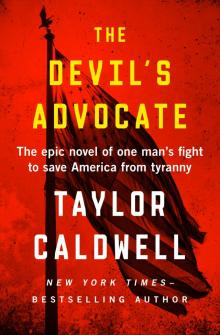 The Devil's Advocate
The Devil's Advocate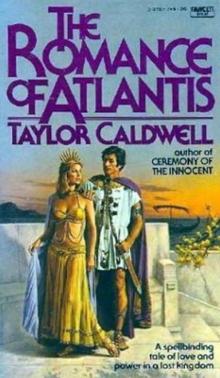 The Romance of Atlantis
The Romance of Atlantis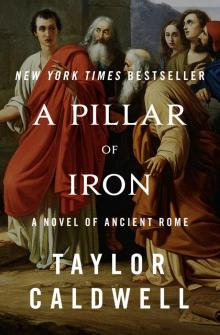 A Pillar of Iron
A Pillar of Iron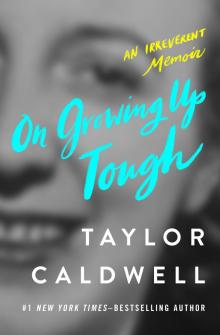 On Growing Up Tough
On Growing Up Tough Your Sins and Mine
Your Sins and Mine